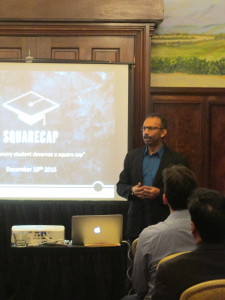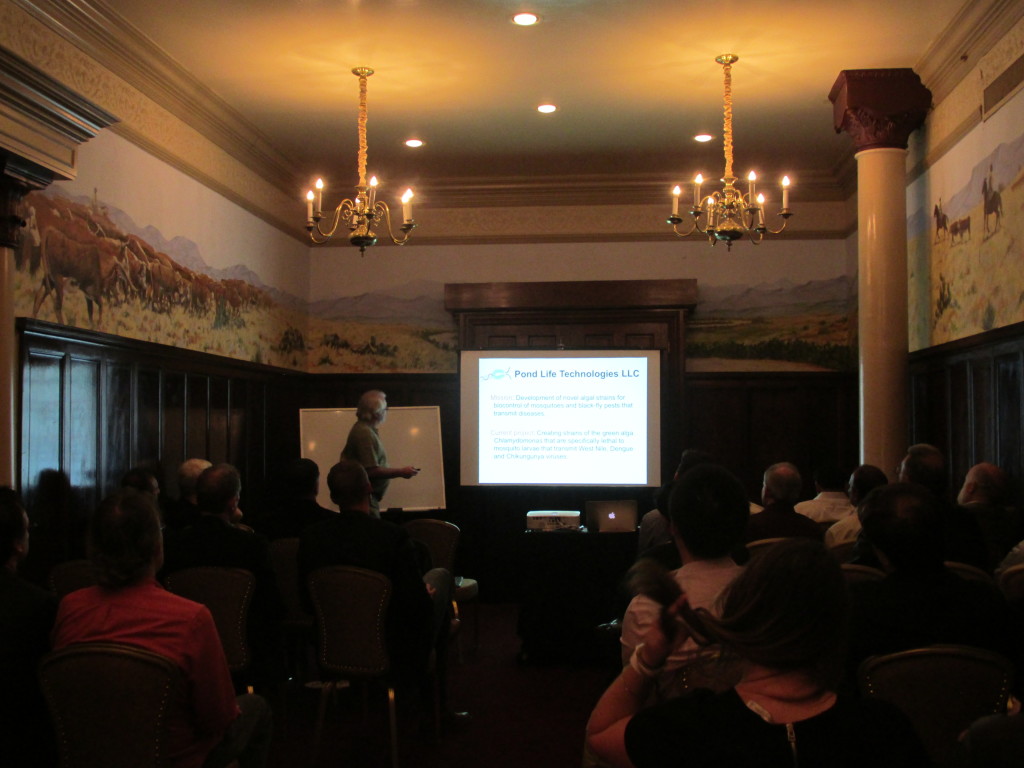By LAURA LOREK
Reporter with Silicon Hills News

NASA’s Valkyrie Robot, photo courtesy of NASA
At the University of Texas at Austin, professors dream up all kinds of applications that could change the world.
But they’ve also got to teach students and oversee the next generation of inventors and entrepreneurs. So how do they get those ideas out of the classroom and into the commercial market?
That’s where the Center for Innovation at the Cockrell School of Engineering at UT Austin steps in. It helps professor-led startups find funding, partnerships, customers, apply for grants and form companies.
Bob Metcalfe, professor of innovation at UT Austin and Louise Epstein, managing director, run the center. Ben Dyer is an Entrepreneur in Residence. Every month, they host the Professor StARTup Studio to showcase three new companies.
WeWork Austin, the UT Office of Technology Commercialization and the Austin Chamber of Commerce sponsor the invitation-only monthly events.
In a private room at the historic Driskill Hotel last Thursday, about 50 people gathered to drink wine, schmooze and hear presentations from the startups. They included Apptronik, a company that makes robots and exoskeletons, Squarecap, a mobile phone app which engages students in the classroom and Pond Life Technology, which manipulations proteins in algae to create a mosquito insecticide.

Luis Sentis, professor at UT Austin and cofounder of Apptronik, a robotics startup.
The first presenter, Luis Sentis, pitched
Apptronik, which creates the guts of NASA’s bipedal humanoid Valkyrie robot. The company has four patents and more pending on its high performance robotic actuators, embedded electronics and real-time control software.
Sentis also leads the Human Centered Robotics Laboratory at UT Austin. And he served as the lead for the DARPA’s Robotics Challenge with NASA Johnson Space Center. He has raised $3.7 million in funding for robotics research through research grants with the Office of Naval Research, NASA, Defense Advanced Research Projects Agency and others, according to his online bio.
“NASA is interested in superhuman strength robots that can go to space and perform complex tasks,” Sentis said.
Sentis and his team moved to NASA’s Johnson Space Center for 18 months to work on the Valkyrie robots. NASA is using his team’s operating system and actuators in the robot’s torso, legs and arms. NASA now has three of the humanoid robots Sentis’ team helped to build.
The Valkyrie robot is being prepped to send on a NASA mission to Mars. The robots can be programmed to work with tools and complete complex tasks like changing out parts or building in space.
“We are focused on making system level, mission ready capable robots,” Sentis said.
The robots also have applications for the military and law enforcement, Sentis said. They can look for survivors in disasters, detect and disarm bombs and more, he said.
In addition to the humanoid robots, Apptronik is creating exoskeletons for applications in the healthcare industry to allow disabled people to walk and move easily without a wheelchair.

Sata Sathasivan, professor at UT Austin and founder of Squarecap.
The second presenter, Sata Sathasivan, a senior lecturer who teaches cell and molecular biology courses at UT Austin, founded
Squarecap, a personalized learning platform, two years ago.
He started the company to help students graduate.
“I’ve been a teacher at the University of Texas for the last 25 years and I have seen students come with dreams of becoming doctors or engineers or scientists or whatever they want to be but one out of three do not make it to graduate,” Sathasivan said.
His wife is also a teacher in mathematics so this is a conversation they had frequently and they wanted to address, Sathasivan said. Now his son serves as the company’s chief technology officer. They have four full time employees and seven part time employees, all graduates of UT Austin, he said.
Squarecap makes a mobile app that professors use to engage their students through their smartphones, tablets or laptops. The Squarecap app can conduct quizzes, allow students to ask questions anonymously and it gathers data and analytics on student attendance and performance.
Today, 10,000 students at UT Austin use the app, which costs $10 per semester, per student for unlimited classes, Sathasivan said. And for all the professors using Squarecap, the company has 100 percent retention.
“One fourth of the UT Austin undergraduate student population is using the program,” Sathasivan said.
Next year, Squarecap plans to expand to more campuses nationwide and 50,000 students.
“The core area we want to focus on is to help our students succeed and make sure they receive a square cap,” Sathasivan said.
Squarecap has raised funding from angel investors and is looking at raising a Series A round, Sathasivan said.
What is Squarecap? from Squarecap Admin on Vimeo.
The last presenter, David Herrin, a professor of biology at UT Austin, presented Pond Life Technology. The startup won a National Science Foundation Small Business Innovation Research $150,000 Phase I grant this year to use green algal strains to kill mosquitos, which carry West Nile virus.
In the U.S., West Nile virus killed hundreds of people in the last few years, Herrin said. There is no vaccine for the virus so mosquito control is the way to deal with the problem, he said.
Also, controlling West Nile virus reduces the transmission of other disease like Dengue.
Herrin is working to create a product, based on algae, that is more effective than chemical pesticides and does less harm to the environment, Herrin said.
In a nutshell, Pond Life Technologies’ mosquito control products consist of its yummy eukaryotic green algae called Chlamydomonas that can swim and reproduce in water. The algae can be sprayed into areas with standing water. Then the mosquitos come along and land on the stuff and eat it up and die.
Herrin is the process of applying for Phase II SBIR grant to provide more research funding. Once that research is complete, the company will apply to the U.S. Environmental Protection agency and complete safety testing trials on its impact on humans and animals.

David Herrin, a professor of biology at UT Austin and founder of Pond Life Technology
![]() Oracle announced last Friday that it has acquired StackEngine, a year old Austin-based startup focused on cloud computing.
Oracle announced last Friday that it has acquired StackEngine, a year old Austin-based startup focused on cloud computing.
